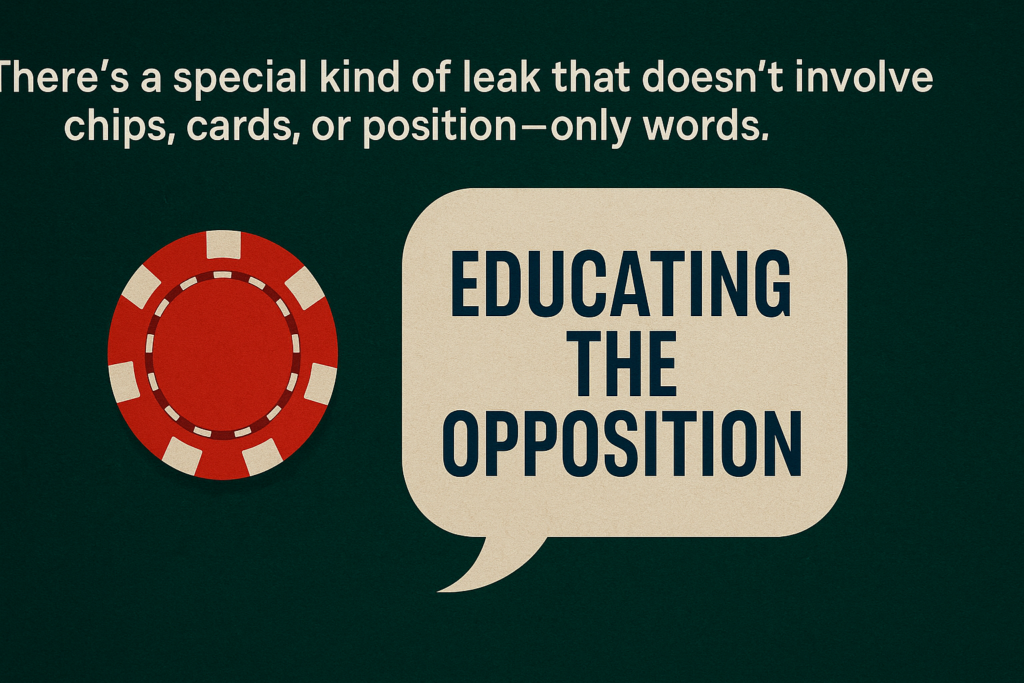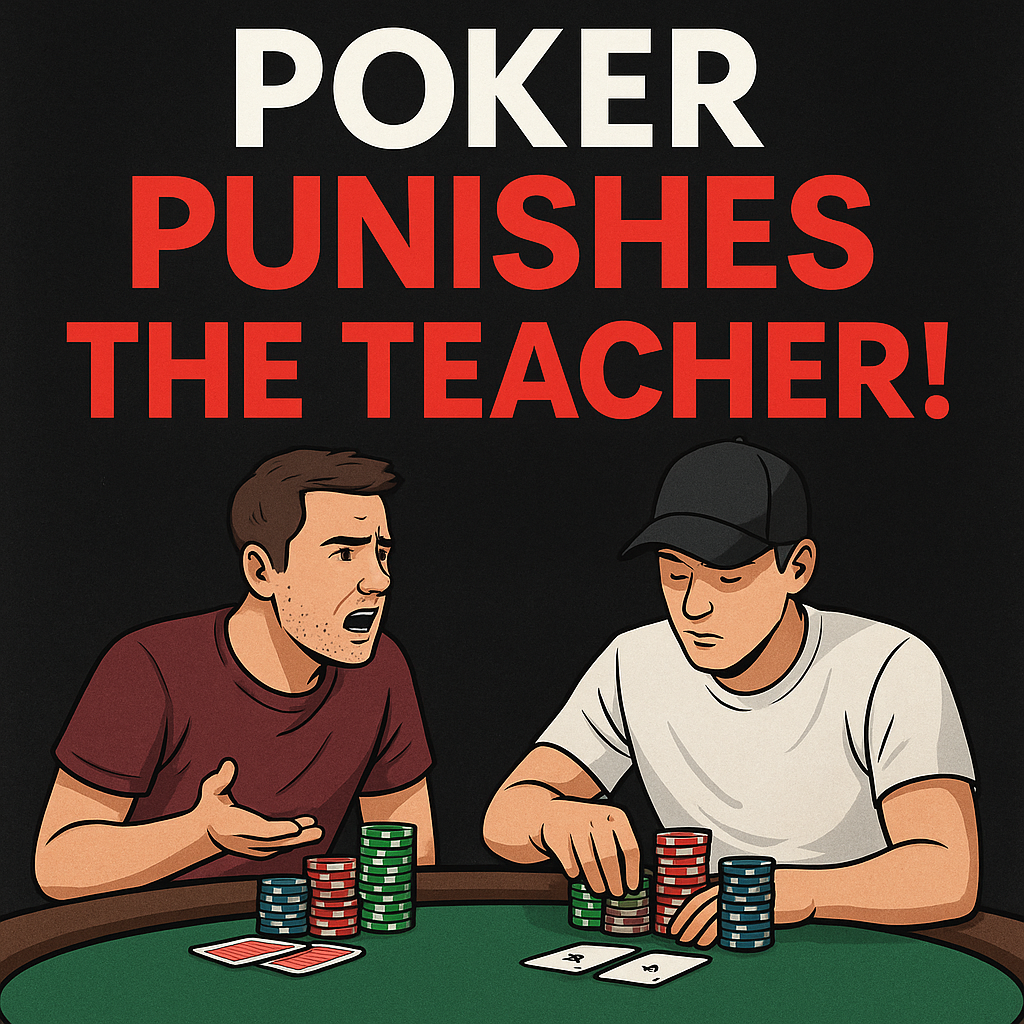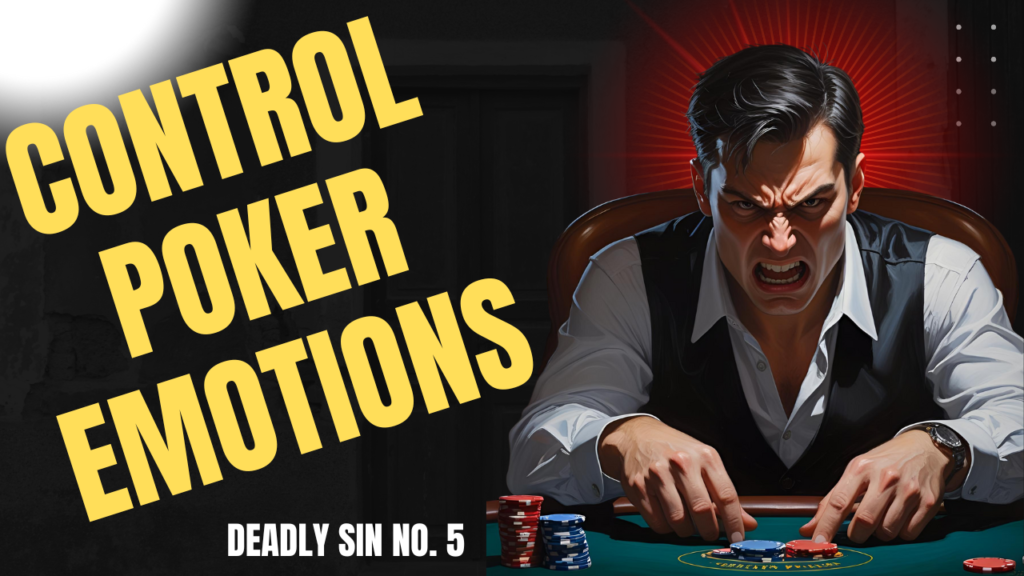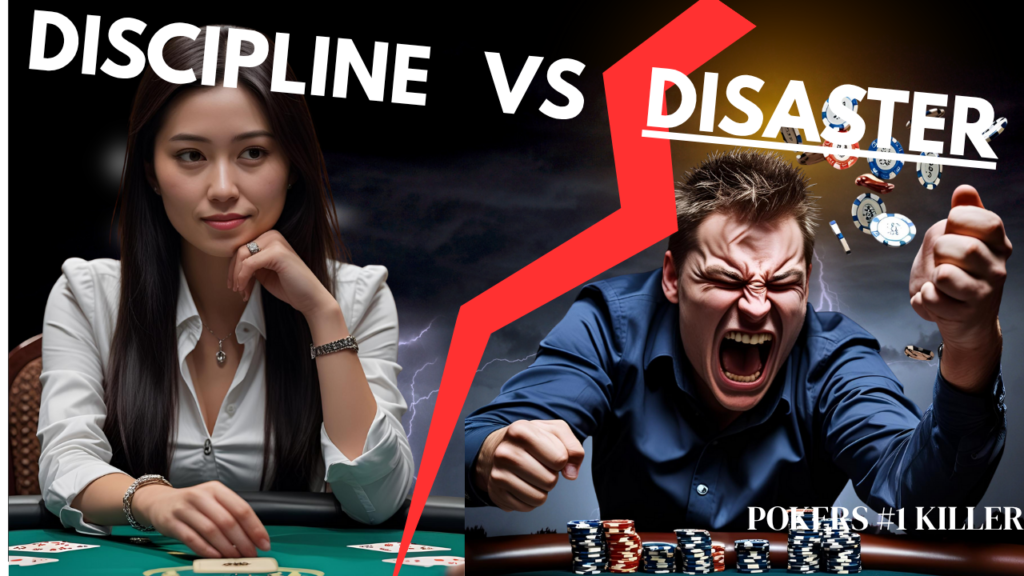DEADLY SIN NO. 8: EDUCATING THE OPPOSITION
WHY SMART PLAYERS STAY SILENT
There’s a special kind of leak that doesn’t involve chips, cards, or position—only words.
It’s called educating the opposition, and it happens every time a player can’t resist showing a bluff, explaining a decision, or giving a quick lecture on pot odds after a bad beat.
At first glance, it feels harmless. Maybe even justified. After all, the table should know you made the “right” play, right?
But the moment you start explaining, you’re doing your opponents’ homework for them.
You’re teaching them how you think, how you react under stress, and how to exploit you next time.

Poker isn’t a classroom—it’s an exam.
And every time you talk too much, you hand out the answer sheet.
In this installment of the Deadly Sins of Poker series, we’ll break down why players can’t resist educating the opposition, what psychological forces drive that behavior, and how silence—not speech—creates real power at the poker table.
THE PSYCHOLOGY BEHIND THE LEAK
Every bad habit in poker has a psychological root.
And educating the opposition is no different. It’s not about generosity—it’s about ego. When players explain, defend, or correct, they’re not teaching others as much as they’re reassuring themselves.
EGO VALIDATION - THE NEED TO BE "RIGHT'
THE AUDIENCE EFFECT - POKER VS PERFORMANCE
When you lose a hand, your brain scrambles to protect your self-image. That’s classic cognitive dissonance, a term coined by psychologist Leon Festinger in 1957.
We resolve the discomfort of losing by rationalizing: “I made the right play; I just got unlucky.”
It’s emotional duct tape for the ego—but at the poker table, it leaks information every time you talk.
Players often believe they’re reinforcing discipline or defending logic. In reality, they’re revealing how they process pressure and how they interpret variance.
And sharp opponents pick up on that instantly.
.
There’s a hidden social force in every live game: the audience effect.
The more people watching, the stronger the urge to justify or narrate. Psychologist Robert Zajonc described this as social facilitation—our performance changes when others are observing us.
At the table, it sounds like:
“I knew he had the flush draw, but I had to call.”
The player isn’t talking to his opponent—he’s talking to the audience, trying to look smart.
But poker isn’t a stage play. The moment you start performing, you stop perceiving..
STATUS & SUPERIORITY - THE ALPHA REFLEX
INTIMIDATION & CONTROL - THE FALSE EDGE
Then there’s the primal side of educating the opposition—the instinct to dominate.
Some players talk to prove they’re in control or to show intellectual superiority. But poker punishes arrogance faster than any other game.
Henri Tajfel’s Social Identity Theory (1979) explains it perfectly: we boost our self-esteem by comparing ourselves to others.
That’s why you see players criticizing weaker opponents instead of quietly stacking their chips.
When you lecture someone, you’re not intimidating them—you’re informing them.
Some players justify their table talk as “mind games.” They think criticism or over-analysis puts opponents on tilt.
In truth, it shows emotional instability and strategic insecurity. You’re telling everyone what gets to you.
And the sharpest players will remember every word.
“You just told them how to beat you next time.”
.
WHAT WE THINK WE GAIN VS WHAT WE ACTUALL LOSE
Most players who fall into the trap of educating the opposition believe they’re gaining respect, establishing dominance, or teaching someone a lesson.
In truth, they’re giving away information, inviting exploitation, and training their own opponents.
It’s one of the most ironic self-inflicted wounds in poker — and one that even smart players repeat for years.
The Illusion vs. The Reality
What We Think We’re Gaining | What We’re Actually Losing |
Respect for our “knowledge” | Our table image of composure |
Recognition as a “pro” | Valuable data about how we think |
Validation after a bad beat | Control of emotional perception |
A teaching moment | Edge against weaker opponents |
Revenge or justification | Our ability to stay unreadable |

The delusion is emotional comfort; the reality is strategic damage.
Poker doesn’t reward explanation—it rewards observation.
Every time you explain a hand, you give your opponents a peek behind the curtain of your decision-making process.
They start piecing together your betting patterns, your emotional triggers, and how you handle loss.
Even when they don’t understand what you said, they can still learn how you reacted.
Your tone, pace, and posture all reveal more than the words themselves.
In short: silence keeps them guessing. Talking teaches them everything.
THE PSYCHOLOGY OF WHY WE CAN'T STAY QUIET
If you’ve ever caught yourself explaining a bad beat out loud — and regretted it five seconds later — you’ve already experienced the tug-of-war between ego and poker emotional control.
We know silence is strength, yet something inside compels us to talk. That impulse isn’t random; it’s rooted in three well-documented psychological phenomena.
THE DUNNING-KRUGER EFFECT - WHEN CONFIDENCE OUTRUN COMPETENCE
THE SELF-SERVING BIAS - PROTECTING THE EGO AT ALL COST
THE SPOTLIGHT EFFECT - NOBODY'S WATCHING (BUT WE THINK THEY ARE)
Psychologists David Dunning and Justin Kruger (1999) discovered a curious pattern:
people with the least skill often overestimate their ability — and they talk the most about it.
In poker, this manifests as the player who always explains their reasoning.
They misapply advanced terms, quote solvers they barely understand, and believe that sounding intelligent equals being intelligent.
As the saying goes:
“The less they know, the more they talk.”
When skill lags behind ego, silence feels like insecurity.
But to the truly disciplined player, silence is confidence.
This one’s as old as poker itself.
Wins are the result of skill; losses are the result of bad luck.
That’s the self-serving bias in action — our brain’s way of defending self-esteem, even when it costs us image and edge.
When players lose a hand and immediately launch into an explanation, they’re not clarifying for others—they’re consoling themselves.
“I played it right,” they insist, because admitting error feels worse than losing chips.
But every word is a signal.
Strong players read those justifications as emotional cracks—proof that your poker emotional control is slipping.
Thomas Gilovich and Kenneth Savitsky (2000) coined the spotlight effect, the belief that others notice us far more than they actually do.
At the poker table, this illusion makes players overreact to small moments.
They explain hands no one asked about.
They replay bad beats for an audience that’s already moved on.
We think everyone’s judging us; in truth, they’re just waiting for the next hand.
Every one of these mental traps chips away at discipline.
And the more we talk, the less we listen—the less we observe.
Poker emotional control isn’t just about suppressing tilt; it’s about mastering silence.
THE COST OF TALKING - WHEN SILENCE MAKES YOU MONEY
Poker punishes the teacher.
Every time we talk too much at the table—showing cards, explaining decisions, or replaying a bad beat—we are educating the opposition.
We may think we’re venting, teaching, or even defending ourselves, but in truth, we’re handing out free information to the very players trying to take our chips.
Every unnecessary word reveals something—about our thought process, emotional control, or even the range of hands we play in certain spots.
And the sharp players, the ones who listen more than they talk, are taking mental notes.
They’re learning what makes us tick while we lecture them on what they should have done.

EGO & THE DESIRE TO SPEAK
The irony is that the motivation to speak usually comes from ego.
We want to be respected, understood, or vindicated after a bad beat.
But poker doesn’t pay us for being right—it pays us for being quiet.
And the moment we try to prove we’re right, we start to lose what matters most: uncertainty.
When opponents can predict what we think or how we react, they can predict how we’ll play.
Watch a seasoned professional after a big hand.
No explanation, no commentary—just silent composure as they stack their chips.
Now contrast that with the talkative amateur, narrating every detail of the hand they just lost, desperate for validation.
One wins pots; the other wins arguments.
And in poker, arguments don’t cash out.
The essence of educating the opposition lies in this:
You think you’re teaching a lesson, but you’re really writing a manual on how to beat you.
Even weak players pick up clues—they remember your tone, your phrasing, and emotional tells.
Given enough of those lessons, the once-weak player becomes a threat.
You’ve literally trained your competition.
Poker is not about performance—it’s about preservation.
Silence is your armor, and restraint is your weapon.
In a game where every edge counts, the ability to say nothing when every fiber of you wants to speak might be the most profitable discipline of all.
.
the fix - how to stop educating the opposition
Recognizing the problem is only half the battle. The real work begins in retraining the mind — learning to resist the impulse to talk, explain, or justify. Developing this level of poker emotional discipline training doesn’t come from theory; it comes from repetition and awareness.
The first step is to reframe your ego.
You don’t have to prove you’re right — you only have to prove you’re profitable.
The table doesn’t reward speeches; it rewards decisions. Each time you feel that urge to defend your play or explain your thinking, stop and remember: the players you’re talking to aren’t your students. They’re your competition. Why help them understand the very patterns you’re trying to conceal?
When the need to speak rises, use it as a trigger to breathe. Count to ten.
Every pause is a chance to reclaim your composure and re-center your focus. Poker is a game of observation, not confession, and the quietest player at the table is often the one gathering the most data.
Replace words with notes — not the kind you write down, but the kind you store in your head.
Instead of explaining why a hand went wrong, silently study what your opponents did right. Every detail you notice strengthens you; every word you say strengthens them.
Learn to make silence your form of aggression. The best players understand that silence unnerves people — it makes them fill the space with nervous chatter, and in that chatter, they reveal themselves.
When you master the art of saying nothing, your opponents start talking for you.
In poker, mystery equals money.
The fewer words you speak, the less others know.
And the less they know, the more you win.
This is how you stop educating the opposition — not by changing what you know, but by controlling what you share.
POKERS QUIET PROFESSIONALS
In every poker room, there’s a certain kind of player who rarely speaks.
They don’t comment on bad beats, they don’t lecture opponents, and they never announce how good they are.
They just play — patient, unreadable, unshakable.
Those are the players who understand the quiet truth of the game: poker doesn’t reward expression; it rewards observation.
Every time you talk, you’re giving something away — emotion, logic, frustration, or simply attention.
And attention is currency. The pros spend it wisely.
Contrast that with the player who needs to be seen.
He wants credit for the fold he made, sympathy for the river that burned him, validation for the bluff that didn’t work.
But the moment he opens his mouth, he tells the room everything it needs to know: that his ego is louder than his discipline.
Real professionals don’t educate the opposition — they let the opposition educate them.
They learn from every reaction, every hesitation, every word spoken by someone who hasn’t yet learned the value of silence.
That’s the quiet paradox of poker: the fewer lessons you try to teach, the more you actually learn.
So the next time you feel the need to explain yourself, pause.
Stack your chips, take a breath, and remember — your best story is the one your bankroll tells for you.
CLOSING MORAL - POKER ISN'T A CLASSROOM
Poker isn’t a classroom — it’s an exam. And the only grade that matters is the number of chips in front of you. The great players understand that poker doesn’t reward generosity; it rewards discipline, patience, and silence.
Every time you educate your opponents — by showing your cards, explaining your logic, or reliving your bad beats — you’re giving them a free lesson they didn’t earn. You’re teaching the test while you’re still taking it.
This is the ultimate poker psychology lesson: ego seeks validation, but profit seeks information. The more you talk, the more you teach. The more you teach, the more you lose.
If poker is about exploiting mistakes, then every time you educate someone, you’re erasing your own edge. Don’t teach them. Let them keep paying tuition.



